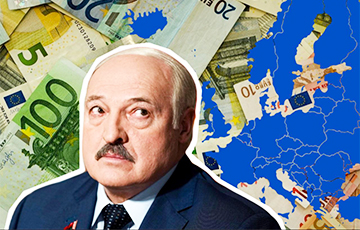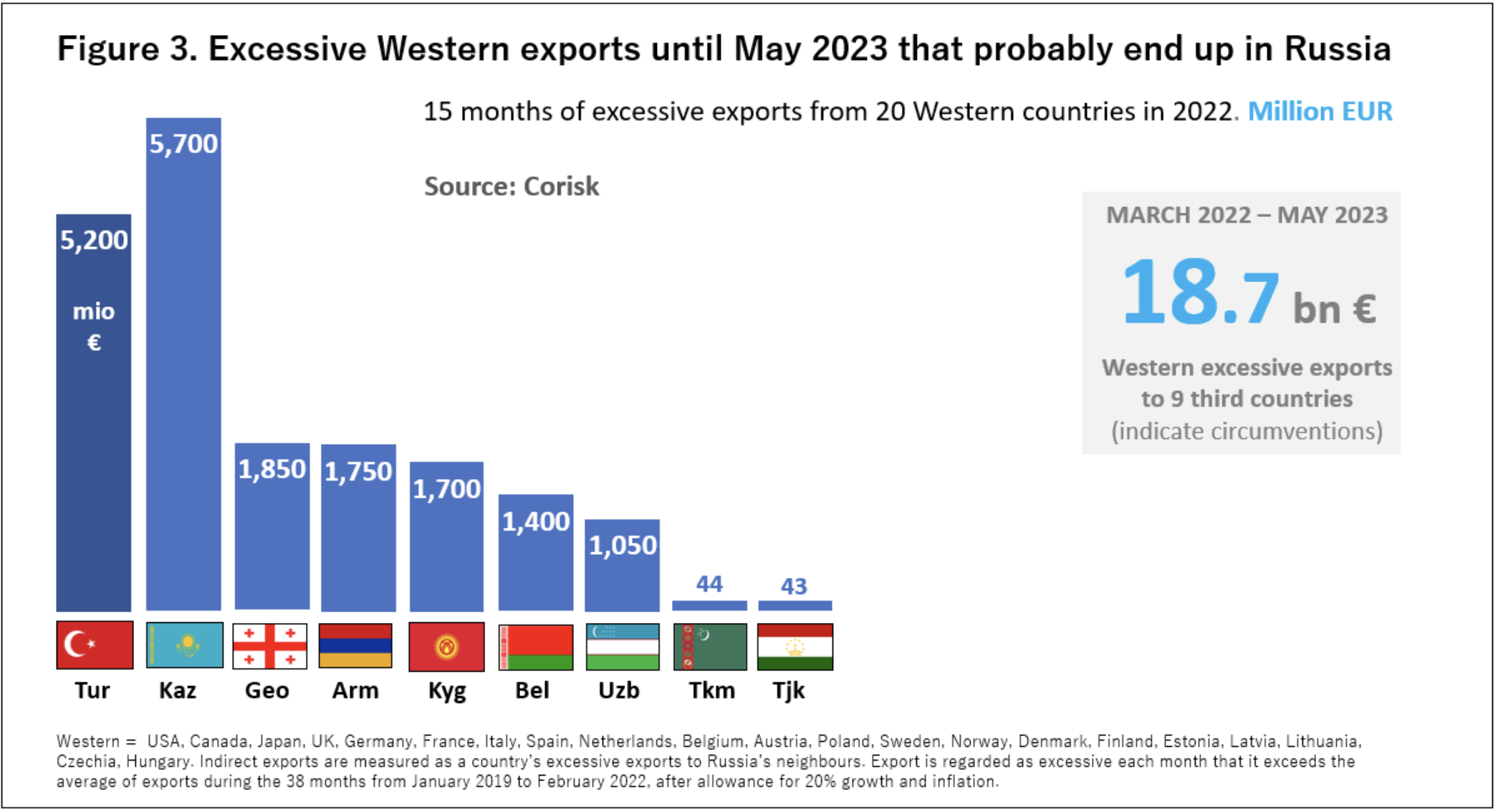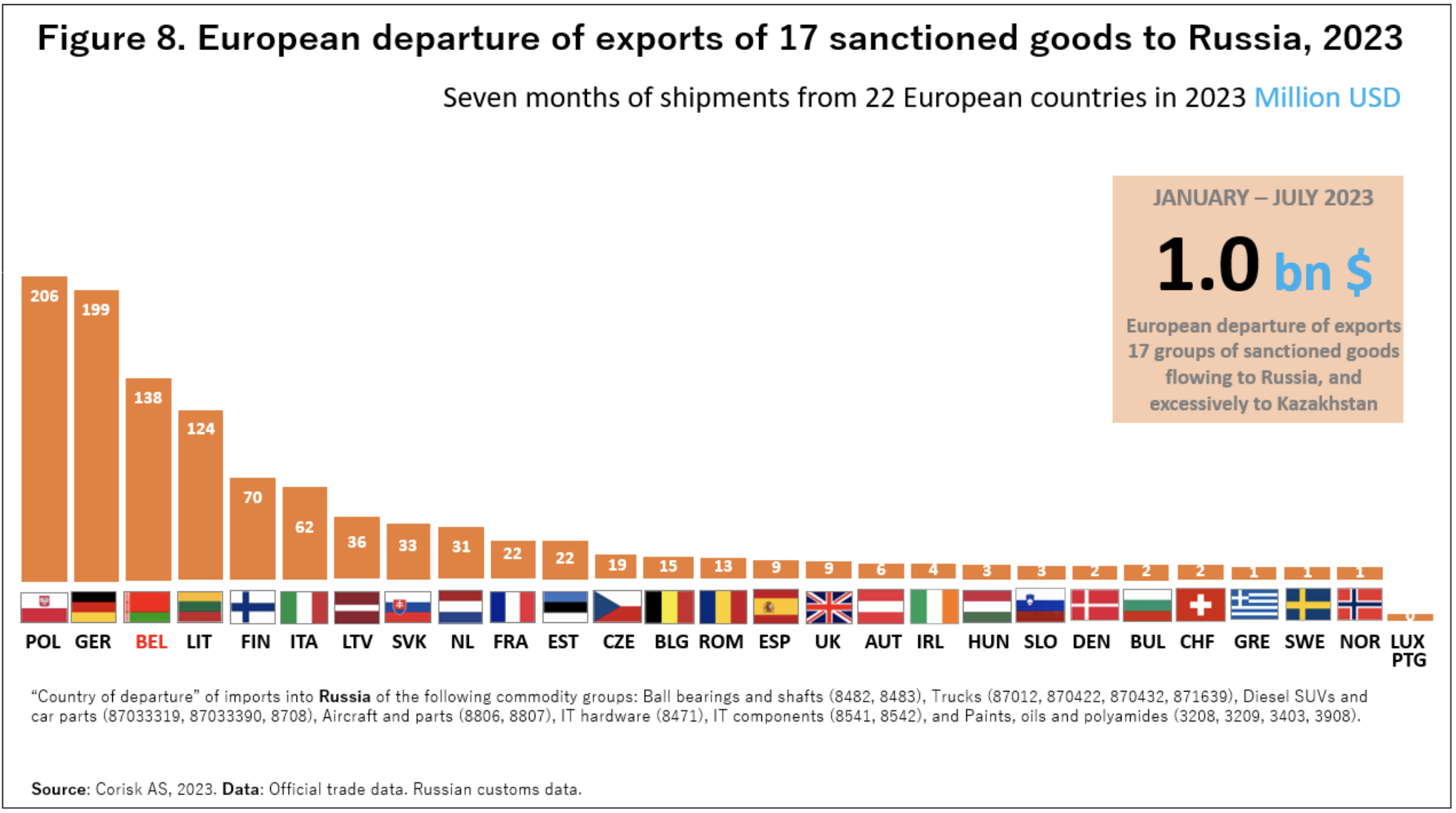That's How Lukashenka And Western Countries Help Russia Circumvent Sanctions
36- 30.01.2024, 17:33
- 39,650

Facts that will surprise you.
Why is it possible to circumvent sanctions against Russia imposed by the West? What role does the Lukashenka regime play in this? Which European countries were the leaders in violating the restrictive measures?
Experts from the Norwegian Helsinki Committee in cooperation with Corisk risk analysis company, Wikborg Rein law firm and The Rud Pedersen Group European consulting agency answer these questions in their report.
The experts provided the report to the European Belarus Civil Campaign, it was translated from English into Russian. The experts provided the report to the European Belarus Civil Campaign to be translated from English into Russian. The Charter97.org website got acquainted with the report and presented the most interesting facts.
You can read the full version of the report here.
The authors of the report believe that the Russian Federation can continue the war in Ukraine largely due to Western technologies through the circumvention of sanctions. Experts cite data that Turkey and Kazakhstan are key gates for the flow of sanctioned goods to Russia.
"More surprisingly, our findings reveal that large quantities of war-relevant goods also flow directly from Europe to Russia," the report reads.
A few Western countries display particularly large direct outflows of sanctioned goods, including Poland, Germany, and Lithuania, the latter shipping sanctioned goods partly via Belarus.
Analysts say about the danger that the Western sanctions coalition may split and suffer “sanction fatigue”.
“Harmonization of compliance is thus key, and the EU, UK and US play leading roles in this effort,” the experts said.
The authors of the report emphasize the special role of the Lukashenka regime in circumventing the Russian sanctions.
“While the Belarus sanctions have been strengthened and to some extent harmonized with the Russia sanctions, with the latest measures introduced in August 2023, there are still differences between the regimes. Our findings suggest that Belarus remains a channel for certain sanctioned war-relevant goods from the coalition to Russia,” the report reads.
Many goods that fall under the sanctions end up in Russia through the countries of the Eurasian Economic Union.
“The EU should consider extending the current military and dual-use licensing regime to include a much larger group of war-relevant goods, including digital components. Such restrictions could decisively reduce Russia’s access to some key technologies,” experts conclude.
The authors of the report see one of the solutions to the problem in the introduction of a quota regime for trade with the EAEU member countries and some other states that may supply sanctioned goods to the Russian Federation.
Are the sanctions harmful to ordinary Russians and Belarusians?
The experts also responded to critics of the sanctions. In particular, those who say that restrictive measures can harm the populations of the countries against which they are imposed.
A study by Gutmann, Neuenkirch & Neumeier (2019), cited by the authors of the report, provides a comprehensive empirical analysis of the effects of economic sanctions, and it offers some interesting insights into the argument that sanctions in general have adverse effects on the local populations of the targeted countries. Researchers find no support for the adverse effects of sanctions on the economic situation, political and civil rights, or basic human rights.
This study suggests that the impact of sanctions is more nuanced and complex than often portrayed, and that sanctions can, in fact, have a positive impact on local populations in targeted countries.
According to the group of experts, impunity was the reason for more aggressive actions by Russia.
The lack of a forceful political and legal response to violations of human rights in Chechnya may have emboldened Vladimir Putin. This freed his hands to attack Georgia in 2008 and Ukraine in 2014.
What mechanisms does Russia use to circumvent sanctions?
The authors of the report cited data showing the huge role of Turkey in circumventing sanctions against the Russian Federation.
The researchers found abnormal exports of Western goods to eight neighboring countries of Russia, the former Soviet republics, as well as Turkey, exceeding the annual growth rate of 20%.
Altogether, in the 15 months between March 2022 and May 2023, our 21 Western countries conducted excessive (abnormal) exports to the value of 18.7 billion Euros, which indicates the level of indirect exports to Russia.
Germany stands out with almost a quarter of all excessive Western exports to Russia’s neighbors, whereas Lithuania and Poland also facilitate very significant excessive sales via third countries.
Figure 3 shows the same estimate of excessive Western exports to Russia’s neighbors since March 2022, but this time broken down to depict the importing or facilitating country filling the role of an intermediary.

Kazakhstan accounts for the largest share of surplus exports of Western goods, almost a third of the total for the 15 months under consideration. Turkey takes the second place – more than 5 billion euros.
The authors of the report draw attention to Belarus: the estimate of excessive exports and indirect violations through our country is 1.4 billion euros. However, these data are probably significantly underestimated.
“This is because Belarus itself has been the subject of sanctions since March 2022, which initially brought down Western exports to the country and makes it much harder to establish a good historical baseline for comparison. Customs data indicate larger Western indirect exports via Belarus, than the data presents,” the report reads.
Figure 8 shows thatPoland and Germany are leading in shipping the sanctioned goods to Russia, but there are also substantial shipments from Lithuania and Belarus, of which micro data reveal that exporters in Lithuania ship many sanctioned goods to Russia via Belarus.

Also, Finland, Latvia, and Estonia also portray substantial direct shipments to Russia.
The report reads that countries in Northern Europe mainly export indirectly to Russia via northern routes, with Kazakhstan and Kyrgyzstan important transaction facilitators.
The United Kingdom and South European countries mainly make use of indirect export routes via Turkey
Customs data reveal substantial Western exports to Russia via the northern routes of Finland, the Baltics and Belarus, where the official exporter is a company from an ex-Soviet state. Companies registered in countries like Kazakhstan can assist Russian importers in the critical middleman function of providing currency for payment.
Many goods go to Russia directly.
Evidence indicates that several EU member states allow direct exports of sanctioned goods from their territory to Russia.
Turning to the trading agents or companies performing the formal export sales to the Russian importers, these are predominantly registered in Finland and Norway themselves, followed by Turkey and Switzerland, and somewhat smaller values from the United Arab Emirates, Kyrgyzstan, Cyprus, China, Uzbekistan, Belarus, and Estonia.
Foreign trading agents may perform the last-chain sales to Russia because the Russian importer is unable to acquire the foreign currency needed to carry out the purchase from Finland or Norway directly.
The authors of the report give examples of 10 real-life trades where sanctioned goods go directly to Russia.
1. Industrial equipment worth 2.4 million USD, shipped directly from the Nordic country of production to the city of Chelyabinsk in Russia, sold by an exporter registered in Switzerland.
2. Shipping equipment worth 350,000 USD, shipped directly from the Nordic country of production to Novgorod Airport in Northwestern Russia, sold by an exporter registered in the Nordic country.
3. Shipping equipment worth 341,000 USD, shipped from Tallinn in Estonia to St. Petersburg, sold by an exporter registered in Estonia which has carried out many sanctioned exports to Russia and was sanctioned by the US government from May 2023.
4. Oil products worth 282,000 USD from the Nordic country of production, shipped from Lithuania to Russia, sold by an exporter registered in Turkey.
5. Industrial products worth 267,000 USD, shipped from the Nordic country of production to southern Russia, sold by an exporter registered in Georgia.
6. Car parts worth 191,000 USD from the Nordic country of production, shipped from Minsk in Belarus to Russia, sold by an exporter registered in Kyrgyzstan.
7. Airport equipment worth 80,000 USD from the Nordic country of production, shipped by air from Vilnius Airport in Lithuania to Moscow Airport in Russia, sold by an exporter registered in Turkey.
8. Energy industry equipment worth 80,000 USD from the Nordic country of production, shipped from Lithuania to Moscow, sold by an exporter registered in Turkey.
9. Shipping equipment worth 11,200 USD, shipped directly from the Nordic country of production to the city of Kronstadt in Russia, sold by an exporter registered in Turkey.
10. Digital equipment worth 6,000 USD, shipped from Vantaa in Finland to St. Petersburg, sold by an exporter registered in Estonia, which was sanctioned by the US government from May 2023.
Will there be a trial of sanctions violators in The Hague?
Experts pay special attention to the possible liability of legal entities and individuals who assisted to circumvent the sanctions. The authors of the report mentioned a warrant for Putin's arrest for crimes against humanity from the International Criminal Court, as well as other investigations into the crimes of the Russian Federation.
“The findings, arrest warrants and investigations are of relevance to companies which could become complicit in Russia's criminal acts if they are considered to have actively aided and abetted in a material way the commission of such crimes,” the experts wrote.
It is possible that the actions of persons involved in violations of sanctions against Russia will be considered as assistance and support of the military efforts of the Russian Federation, and, consequently, to its war crimes.
Experts believe that there are already precedents when responsibility for such actions comes. An illustrative example is the case against the French company Lafarge, which continued its operations in regions invaded by ISIS following the terrorist organization's rise in 2013/14. In 2016, the company was accused of financing terrorism and of complicity in (aiding and abetting) crimes against humanity.
Also of interest are a number of investigations into the French bank, BNP Paribas, by French prosecutors. The first, opened in 2017, examined allegations of complicity in genocide against Tutsis in Rwanda, specifically that USD 1.3 million had been transferred by BNP Paribas to a South African arms dealer to finance the purchase of weapons for genocide perpetrators, in violation of a UN arms embargo. BNP Paribas is alleged to have authorized the funds transfer to the Hutu regime in June 1994. The matter is still ongoing.
There are also examples of individuals that have been found guilty of serious human rights violations as a result of sanctions violations.
One example is the prosecution in the Netherlands of a Dutch national for complicity in war crimes through the sale of arms to Liberia in the period 1999-2003, in violation of UN and EU sanctions. At the time, the individual was the owner and president of two logging companies in Liberia.
The prosecution claimed that by facilitating the import of arms into Liberia, the relevant individual – through his companies – violated the arms embargo and thus became an accomplice in war crimes committed with those weapons.107 After several rounds of appeals culminating in a case before the Supreme Court of the Netherlands, the individual was finally convicted in December 2018 (albeit in absentia, having fled to South Africa) and sentenced to 19 years' imprisonment for illegal weapons trafficking and complicity in war crimes through his "active and conscious contribution to the war operations".
Violation of sanctions also affects the reputation of companies. In August 2023, a leading newspaper revealed how German components had been found in the type of Russian missile that killed 23 civilian Ukrainians a few months earlier, bringing scrutiny to the relevant CEO over his company’s responsibilities.
Any company may at any time become the subject of investigations by media or civil society organizations, which possess increasingly sophisticated tools to uncover corporate activities in investment or trade.
Репутация не только привлекает или отталкивает клиентов, но и определяет, сможет ли компания привлечь талантливых сотрудников в будущем. Более того, вкладчики, инвесторы и акционеры обращают все больше внимания на репутацию компаний, на их стандарты этики и соблюдение законодательства.
Apart from attracting or alienating customer confidence, reputation determines whether a company may attract future talent. Even more, institutional investors increasingly focus on corporate reputation, ethical standards, and legal compliance, often built into their portfolio engagement standards.
Since Russia's invasion of Ukraine, prolonged business presence in Russia has often increased domestic pressure on companies to leave, which again has increased the likelihood of an unfair or enforced takeover of assets by Russia - as experienced by Danone and Carlsberg.
“The war in Ukraine is the most defining fight for Europe's future since 1945. This makes it natural to expect that the sanctions will also become stricter. It will not suffice to answer "we didn't know" or "the rules were so unclear" when confronted in the future with the consequences of past sanctions violations,” the report's authors summarize.











